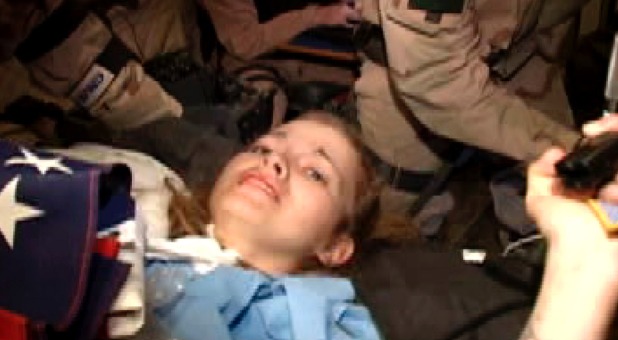Ex-POW Jessica Lynch Remembers ‘the Deadliest Day’
Remember Jessica Lynch? The former prisoner of war made headlines in 2003 after being captured and held by Iraqi soldiers. Her dramatic rescue was seen around the world and made her an instant hero.
On this Veteran’s Day, Wendy Griffith spoke with Lynch about the day she’ll never forget.
“The things that I remember, I remember very clear. It seems like it was yesterday, the noise of helicopters and gun shots, and the, you know, the Humvees rolling through. I remember that moment and just how scared I was,” she said.
Nine days earlier, in late March of 2003, 19-year-old Army Pvt. Jessica Lynch of Palestine, West Virginia, experienced what she calls “the deadliest day.” Her supply convoy took a wrong turn, was ambushed and came under heavy fire. Her gun jammed. All she could do was close her eyes and pray.
The next thing she knew, she was in an Iraqi hospital. She had a fractured spine, broken arm, shattered left leg and no memory of the past three hours.
Wendy Griffith: There were all kinds of stories and rumors about what actually happened to you, whether you were tortured, sexually abused. Tell us, what really did happen those nine days that you were in captivity?
Jessica Lynch: I don’t remember being physically abused. I mean, there are reports that said that this is what occurred, and, you know, they have medical evidence saying this is this and that took place. But I don’t, I don’t really speak about it because I don’t remember it. I wasn’t alert and conscious at the time.
What Lynch does remember is the excellent medical care she received from the Iraqi doctors and nurses.
“They almost became like my guardians. Like, I became connected with, with this group of Iraqis that were staying in the hospital with me because … I mean, this is weird to say, but I really felt like they were my protectors,” Lynch remembered.
Griffith: You were surprised that the Iraqi doctors were trying to keep you alive?
Lynch: Right.
Griffith: Were you a strong believer in Jesus, were you a strong believer in Christ at the time?
Lynch: Yeah, because, I mean, to be honest, I had nobody else to rely on but Him. Like I had no one to talk to. The Iraqis spoke broken English, I’ll just say, broken English, like I could understand bits and pieces of what they were trying to say.
Although she didn’t know it at the time, her best friend, who drove their vehicle, died in the same hospital. Eleven fellow soldiers had been killed—others were wounded or captured.
Then, on April 1, 2003, she heard the sound of freedom.
Lynch: It took me a little bit to, to actually realize what was happening. But then, you know, everything started happening so fast, they were surrounding me, you know. The main goal was just to get me outside of the hospital as quickly as possible, to, to get me inside of the helicopter, and get to Kuwait where, you know, there was a safe haven, that we were out of enemy zone.
Almost four months later, Lynch came home to a hero’s welcome and later received three medals, including the Purple Heart. Although no longer in the headlines, she still carries the trauma both physically and mentally.
Lynch: I have really bad nightmares where these Iraqi men are chasing me.
Griffith: Still?
Lynch: Yeah, and it’s the same dream that—or nightmare—that occurs every single time about these two Iraqi men chasing me. And I, I can’t shake it, and I don’t know what it means. I’ve learned to kind of just, you know, put the past in the past and move on to the future, and that’s the way I like it. But, yeah, it’s getting up every morning and, you know, putting on my brace, and it definitely takes me back to 11 years ago, like ‘I wish this didn’t happen.’
Griffith: So you wear a brace on your leg?
Lynch: I do. I have a leg brace that I wear because of the nerve damage that occurred within my back. I lost all feeling on my left side.”
In the years since that fateful time, Lynch co-wrote a New York Times, best-seller called, I Am a Soldier, Too, earned her teaching degree and became a mother to a little girl.
Now she’s added “actress” to her resume, playing a soldier in “Virtuous,” a film celebrating the virtuous woman in today’s society.
Griffith: Did you ever think you’d be acting?
Lynch: No, no, no, no. This is something that’s completely out of my comfort zone. But I’m glad that I gave it a shot and that I am a part of this film.
Lynch says 11 years and 21 surgeries later, she’s still uncomfortable with the label “hero,” pointing instead to those brave men and women serving right now on the front lines for our freedom.
“And we need to still continue to pray and support them until they’re all home safely,” Lynch said.




























































